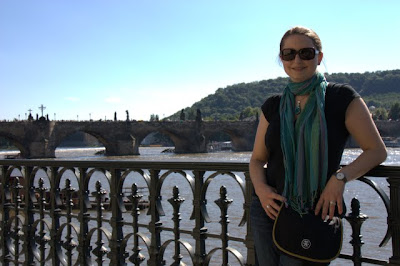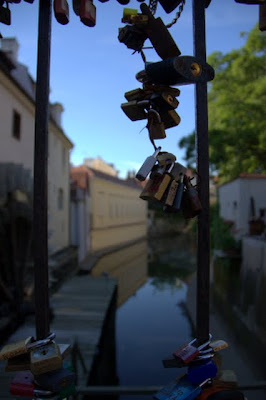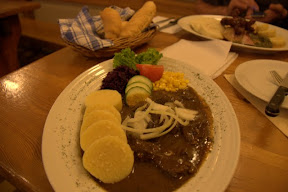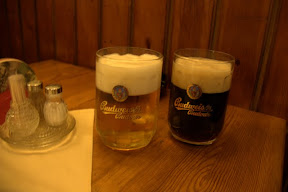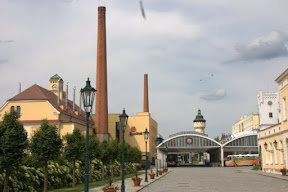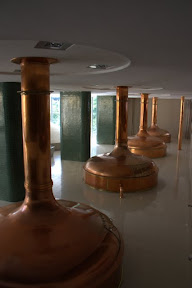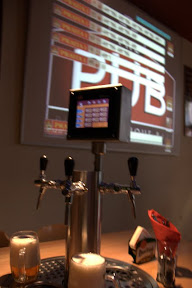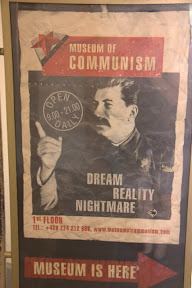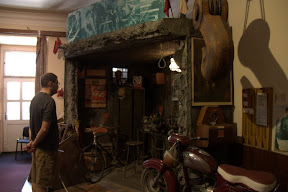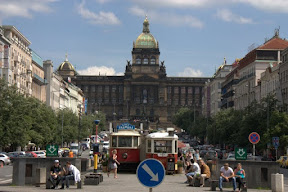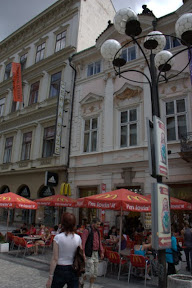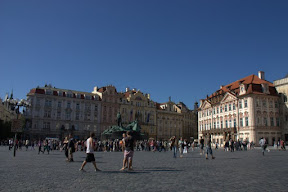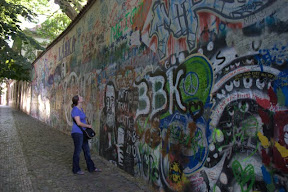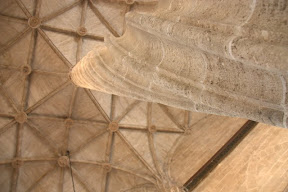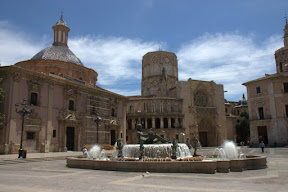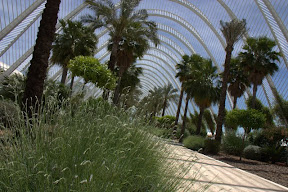Prague in pictures (aka we took 310 pictures in Prague, somebody has to look at them).
In which we drink lots of beer. And eat pig’s knee.
The good part about Prague’s food is that it goes perfectly with beer. The bad thing is that it is notoriously short on veggies and very heavy. To my untrained stomach, it is similar to German food, but…different. There is always a ton of meat. It is best to stick with beef or pork. I ventured over to chicken for one meal, which was a mistake. I also accidentally ordered the largest piece of pork I’ve ever seen short of an entire pig at a pig roast. And apparently it was a pig’s knee. What can I say, I liked the sauce description. Turns out eating pig’s knee is common in the Czech Republic (and Germany for that matter) and it doesn’t taste half bad.
We like the goulashes a lot, and my favorite meal was beef in “candle sauce” (a creamy, lemony, cranberry type sauce).
I don’t mind the sauerkraut, which shocks me. Sean keeps trying to tell me that sauerkraut counts as a vegetable, but I don’t buy it. Maybe the red cabbage. There are always a lot of potatoes in some form. The kvednicky (dumplings) are delicious and soaks up all of the beers we drink.
Look, veggies!
For the last two months, we have been mostly in countries that feature wine as their specialty. I forgot how much I loved beer until we arrived in Prague. It had been a while since I had a good beer, one from the tap with a thick, foamy head on the top. That seems to be par for the course in Prague.
Beer is everywhere in Prague, and due to European’s apparent reluctance to drink water out of the tap, indeed sometimes cheaper than water. They even have beer vending machines.
Did you know that there is a beer in the Czech Republic that is called Budweiser (or Budvar in Czech) and it is much more delicious than Budweiser at home? I did not know this until we had some in Paris. They are two different companies. It is not fair that we get stuck with the crappy Budweiser. We have had some giant, foamy Budvars since our arrival.
Budvar’s biggest competitor in the Czech Republic is Pilsner Urquell, a beer Americans are more familiar with. The original Pilsner Urquell brewery is in Plzen, which is an hour and forty minutes from Prague by train. We ventured to the brewery, and saw the bottling process, tasted hops, malt and barley, saw the copper vats where the beer is brewed for 5 weeks, and tasted an unfiltered beer from their special cellar. We enjoy drinking cask beer at home, which is served at a higher temperature. Perhaps that is why we enjoyed the Czech beer, because it is served at a higher temperature than most Americans are used to. The best beers here have been the ones on draught served unfiltered and unpasteurized. Apparently they have more vitamin B that way, which is a bonus. I am probably lacking essential vitamins due to the lack of vegetables.
Here are our three favorite places we drank beer in Prague:
(1) Breaking my normal rule of no chains, we ate and drank one night at The Pub, which is a Czech chain with several locations in Prague and smaller cities. At the Pub, you can pour yourself an unfiltered Pilsner Urquell from the tap at your table. The computerized screen automatically displays how much beer you have poured, and also shows your tally on a large screen for the whole room to see. The screen displays the top ten tallys for the restaurant, as well as a separate top ten for all of the Pub’s locations. Our immediate thought was, [our friend] Stayduhar could totally crush this competition. As a table of two, we never made it to the top ten of all of the locations, but we are proud to say we stayed on the board for the Praha 1 location. Thank goodness for public transportation.
(2) On our way back to our hotel from metro after our visit to The Pub, we happened across a little bar up the street from our hotel. You want to go in? I said. Sure, Sean replied. What’s one more beer? It was immediately obvious this place did not get many tourists. Lit by candlelight, with David Bowie in the background, you could tell that this was the type of place people came to chill. And chill people did, including the people at the table behind us, who were passing a joint around their table. Spying the unfiltered beers on the menu, we gave more specificity than normal when we ordered, requesting two beers, large, unfiltered. Right, the bartender said. So you mean two beers. Regular beers. They were large, foamy, and delicious. Sean’s one turned into two. When we went to pay, we misheard the bartender and thought he said 180 Czech crowns, an amount which would have been around $8.50 for three half liter beers. No, said the bartender. I said 108. (Around $5 USD). 180? He laughed. That would be expensive. Right. Expensive.
(3) I would have to put the Pivovarsky Klub on the list for its awesome name, even if it didn’t turn out to be as cool as it was. A little off the normal tourist track in Karlin, it was visited by Anthony Bourdain in the Prague episode, and also mentioned on the blog SpottedbyLocals.
Somewhat inadvertently, we also ended up visiting its sister restaurant Pivovarsky Dum, which is a microbrewery.
The beer is great at both places, but we preferred the food at the Pivovarsky Klub. The Pivovarsky Klub has six beers on draught. At least one will be from its sister restaurant, and most of the others are a good sampling of other types of Czech beer besides Pilsner Urquell and Budvar. They also have tons of bottled beers from all over the world. (The American representatives, if you are curious, are Sam Adams and Sierra Nevada). This wide variety of beer might not be unusual in the United States, but in Europe, there is typically only have one or two choices on tap, making ordering beer as simple as saying, two beers, please.
Not so deep thoughts.
Three random, unrelated thoughts about the Czech Republic:
- I was about to take a picture in a grocery store, where a very upset man interrupted his stocking of the shelves to run over to me, yelling urgently for me to stop in Czech. Strange, I thought. Are they worried I was photographing prices for the competition? I couldn’t think of another reason. Then I started seeing signs forbidding the taking of pictures, at places like a cathedral and a shopping mall. (Really, how many people take pictures in a mall except weird people like me?) At least three different tourist attractions charged a not-so-nominal fee if you wanted to take pictures inside the attraction. All of this makes me wonder: Do the Czech people have an aversion to pictures? If so, why are there so many camera stores in Prague? If there is an aversion, is it a holdover from the Communist era?
- I would like to get my hair trimmed. I am too scared to get anything other than a simple trim. Anything more stylish would be a waste anyhow because I usually air-dry my hair and then, at some point in the day when I can’t take it any longer, I end up pulling it back in the heat. I didn’t want to spend a lot of money on a haircut, so I didn’t get one in Spain. I thought Prague might be a good place to get a haircut, but after arriving, I quickly changed my mind. While there are some girls who look cute and stylish like many of the French and Spanish, there are many more with a decidedly 80s or 90s look. The hair in particular is not good. There are lots of mullets, both of the male and female variety. (Even more than Pittsburgh, if you can believe that). There are cuts that are not so much mullets as they are just large on top and flat everywhere else. There are feathers. And there are just too many haircuts featuring large, teased bangs for me to be able to entrust a random hairstylist to give me a simple trim. I think I’ll keep growing my hair for a while.
- Thank goodness there is English everywhere in Prague, or we would be lost. Czech is one of those languages with random consonants inserted in places where I would think there would be vowels. They also like to add the letter y onto the end of words we recognize, which makes the words cuter. Dezerty. Bus linky. Sean likes to pretend he can just add a y on the end of English words, but this does not work any better than his efforts to add an o or a to the end of words in Spain.
Deep thoughts
Prague is, just as promised, completely fascinating. The main reason it is so, I believe, is not just because it has beautiful Baroque architecture still intact, or because it has an old bridge crossing a river with charming views of a castle. Nor is it because it has modern conveniences or places with fun and funky atmospheres. No, it is not even because it has delicious, delicious beer. I think it is because the Czech Republic, and Prague in particular, have such a recent history, which put all of those other attributes in perspective.
 |
| From Prague Part 1 |
Significant events shaping the country have occurred within our lifetimes and within the lifetimes of those we know. I was 10 years old when the Velvet Revolution occurred. All I really remember about the fall of communism is President Reagan making some sort of remark about Michel Gorbechav tearing down the Berlin Wall, but the specifics are fuzzy. I knew that Czechoslovakia was no longer a country, but I didn’t know how or why that happened. The most I could relate to the Czech Republic before I came was that Jaromir Jagr, one of my favorite Pittsburgh Penguin hockey players in the early 90s, was from this area.
Somehow, just being alive when all of these important events happened made it all the more interesting to learn more about the role this region played in the World Wars and the rise and fall of communism. To help us brush up on history, and to learn even more, we visited the Museum of Communism. The museum takes you through the “the Dream, the Reality, and the Nightmare.”
I knew a little bit about the “Dream” from my Marxism class in college, but I didn’t know much about the practical aspects of communism or socialism other than the general sentiment that they were bad. The museum seeks to show you a little bit what life was like, such as the indoctrination of school children, the barter system that was created between those who had anything of value, the alternate currency that was created for foreign luxury goods, and the spying on potential dissenters. It is unconceivable to me that a government regulate even something as intimate as the creation of art, but that’s what happened – as recent as the 70s and 80s.
The musuem also featured the ardent dissenters of communism, such as the student who lit himself on fire in response to the Soviet occupation of Prague in 1969 to control Czechoslovakia’s President’s efforts at softening communism. One group of dissenters were the banned rock’n’roll group the Plastic People of the Universe. To look at them, they look like the long-haired hippies that were protesting different problems in the United States. In a society where information was banned, it is interesting that similarities exist in two totally different worlds.
It is weird to think that at a time when I was sitting through history classes in the United States, learning about things that happened years before my time, Czechoslovakia changed its entire form of government and its economy. Over the course of several weeks in November 1989, Czechoslovakians protested their communist government, culminating in the surrender of the communist government and appointment of a new government (i.e., the Velvet Revolution). Four years later, Czechoslovakia split into two separate countries, the Czech Republic and Slovakia.
Looking around today, it is hard to tell that the Czech Republic used to be a communist society. The irony that the museum is located next to a casino and above a McDonalds is not lost on the creators of the museum, who created posters mentioning that fact. The area around Wencelas Square, the site of many protests, including one where the protesting student set himself on fire, is now home to every international chain you can think of. The streets are filled with tourists from all around the globe.
Some people put down Prague because it does attract so many tourists. There is no doubt that Prague receives an amazing amount of tourists – in fact, we have encountered more people from the United States here than anywhere else on our trip.
But I think the tourism, itself, is an important part of Prague. The fact that Prague is an international travel destination participating in the world economy just over 20 years after fall of communism is precisely what makes Prague such a fascinating place to visit.
A Whole Lot of Nothing
I was going to write lots of posts about Valencia, especially since we were there for 10 days, but sitting here in Prague, Valencia seems like a distant memory.
|
|
| From Valencia, Spain |
It is not that we didn’t enjoy our time there. Like all of the Spanish cities we visited, we really liked Valencia. It is just that nothing exciting happened while we were there. I mentioned previously that due to our excitement over staying in an apartment for a change, we spent a lot of time relaxing. There is not much you can say about that. First, we slept in. Second, we made eggs for breakfast. Third, we surfed the internet and read. Fourth, we went for a walk. Fifth, we looked for a replacement camera…
It was nice to relax in Valencia, because the two months so far have been anything but relaxing. Travel is stressful. Every day involves countless decisions, endless feelings of unfamiliarity, money limitations, getting lost, and figuring things out. Simple tasks often are a two step process, because all too often something goes wrong the first time and you have to set out again, with newly acquired information, to accomplish what you wanted to do the first time. Even something as simple as getting something to eat can be a big production, because first you have to figure out where to go, how to get there, what exactly they are serving, what to order, how much to order, how to express what you want, and how much it is. Even simple sightseeing or wandering is tiring – there is a lot more activity in our days than we ever experienced sitting at our desks back home. Look, travel fatigue is a problem I know many people who are stuck at work would kill to have, but it is a problem nonetheless. And you may not believe me, but there are days where I am hot, tired, and cranky where I have actually muttered the words, I might rather be at work than deal with this.
Of course, we all know that’s not really true.
So if one is in the mood to just hang out for a while, Valencia is the perfect city to do so. After spending two weeks in Spain in earlier in our trip, and leaving and re-entering on three separate occasions, Spain began to feel familiar and more like home, which is what we needed for a little while. Compared to other Spanish cities, there seemed to be less tourists, and more Valencians just living their lives. The weather was sunny almost every day. Although it often topped 80, it got decent breezes from the sea. Some years back, the city diverted its river, and put a park in its place. The result is a winding green space in the old riverbed, where at any given time people are lounging, playing soccer, running, riding bikes, or walking.
Valencia is at once both very modern and very historic. There is a dichotomy between its architecture. Many of the buildings seemed to be blah, ugly high rises.
Yet it also has grand historic buildings, such as the site of the former silk market, or its cathedral housing the Holy Grail (the cup from which Jesus reportedly drank at the Last Supper).
It also is home to the very futuristic City of Arts of Sciences, a fantastic complex of geometric lines.
You would think that a city on the Mediterranean would be focused on the sea, but if it wasn’t for the fresh seafood everywhere, you would almost forget that Valencia is seaside. The beach, or at least the portion we visited, is nothing to write home about, but there are fantastic paella restaurants up and down the promenade. Valencia is the birthplace of paella, and actually features chicken and rabbit as the main type of paella. All of the rice based dishes we had were fantastic, owing to the local rice.
|
|
| From Eating and Drinking in Valencia |
It is a good thing our need to cook coincided with our stay in Valencia, which abounds with local, fresh produce. In addition to oranges, we had great local tomatoes and olive oil. Besides the neighborhood bakery where we often made meals out of empanadas, we were frequent customers at the Central Market. As the name implies, it is a large market in the center of town, featuring every type of food you could need to cook a feast. The first day we visited, we literally followed our noses, letting our sniffers lead us to the sweetest smelling strawberries.
We can vouch that Valencia is a good place to go shopping, both of the real and window variety. I spent some time wandering in and out of funky shops in the Barrio de Carmen neighborhood. We surely visited every camera store in Valencia for our search for a replacement camera and accessories. We also surely visited every shoe store in Valencia in my search for a replacement for sandals that were not a good fit. Although shoe shopping in Spain was now old hat, it became increasingly clear with every shoe store that I apparently have the largest feet ever known to mankind. I wear a US size 10. Prepared in advance this time, my research indicated that a 10 converted to a 42. Upon inquiry of whether the store might have a certain shoe in a size 42, the response typically was 42? Commence sharp intake of breath and vehement head shaking. Oooh. Maybe a 41. There is no way we have a 42. Then the salesperson would return with a 40. Maybe this would work?
| From Shopping in Valencia |
Luckily, I found a stylish, comfortable Spanish brand called Wonders where I took a 41. In case you haven’t noticed my repeating wardrobe, it primarily consists of a green shirt and blue shirt. Combined with my blue purse, I have been sporting a very blue and green centric look. So of course the only Wonders sandals (or really, any sandals) that fit me was a colorful blue and green pair. They are blue leather with green soles. I think I found the only size 41 in the entire city. I should know, as every time I saw a shoe store, I popped in to see if they had size 41 Wonders in a different color so I wouldn’t be so monochromatic. They didn’t, so blue and green it is. I later realized that the walls in our Valencia apartment are painted blue and green. I am surrounded by blue and green.


